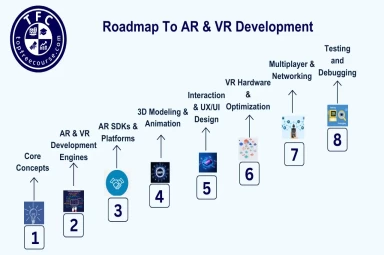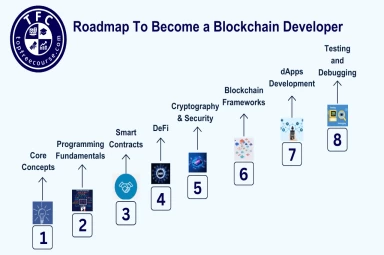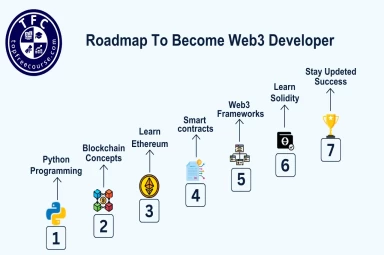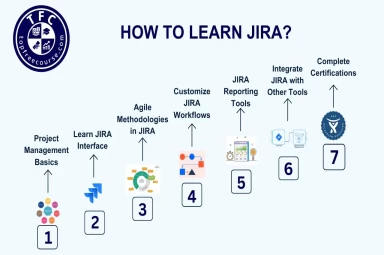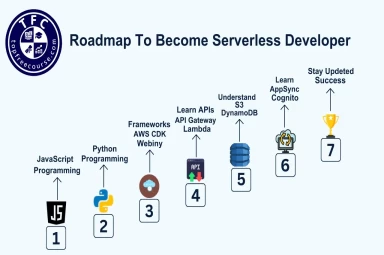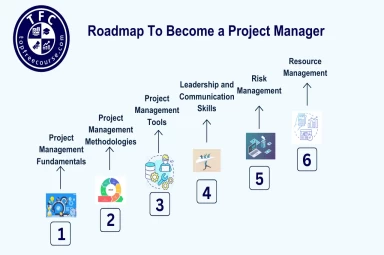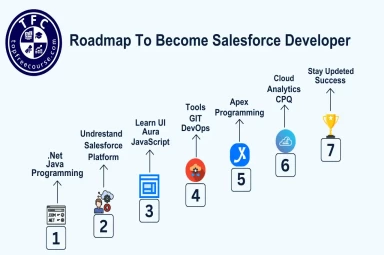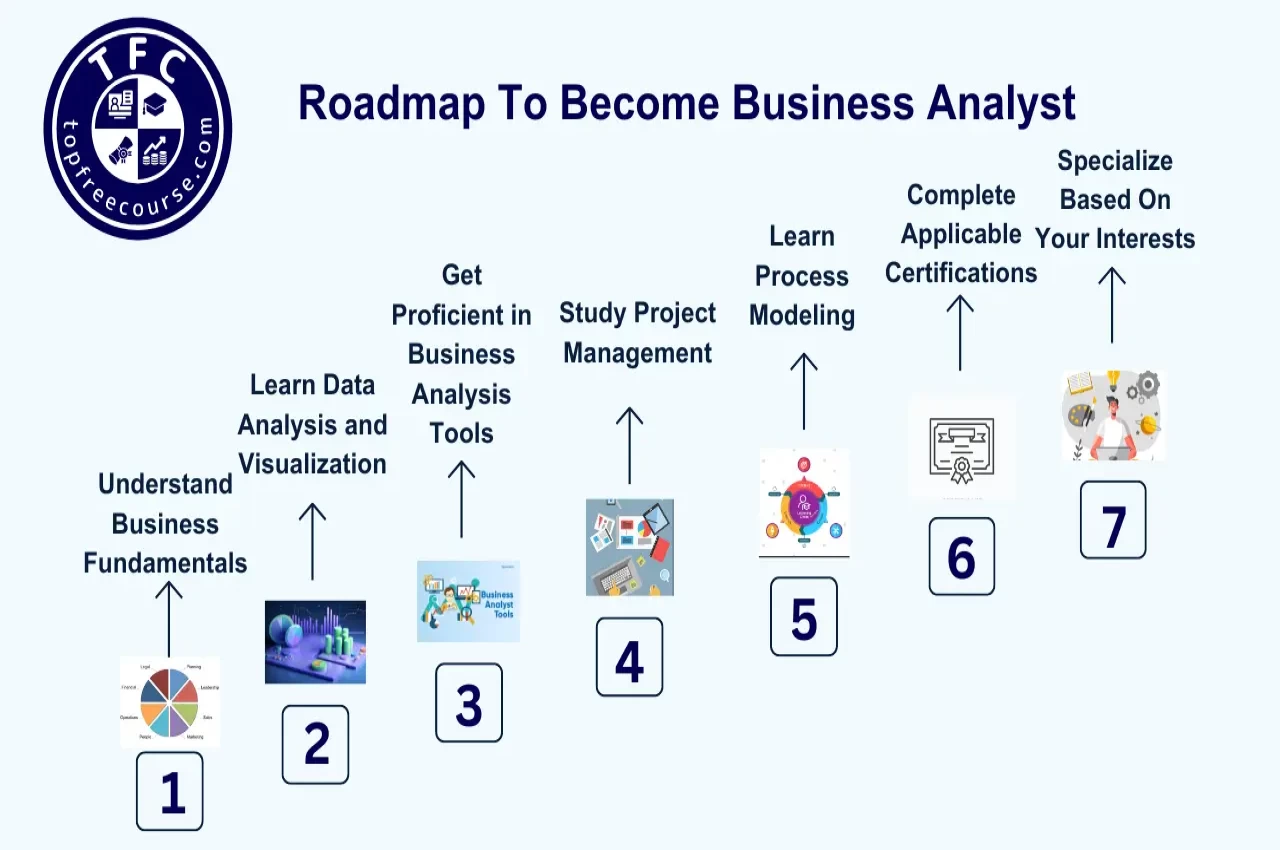
Introduction
In today’s data-driven business world, the role of a Business Analyst has become crucial for organizations to thrive and stay competitive. Business Analysts bridge the gap between business objectives and IT capabilities, ensuring that the business needs are clearly communicated and effectively addressed. If you are looking to kick-start your career as a Business Analyst, it’s an exciting journey that requires a mix of analytical skills, business acumen, and technological know-how. This Business Analyst roadmap is your gateway to mastering this field. TopFreeCourse provides the best business analysis courses and step-by-step guidance you need—for free!
What Is a Business Analyst?
A Business Analyst (BA) is a professional who assesses an organization’s business needs and helps implement technology solutions that align with the company's objectives. BAs work closely with stakeholders, including management, IT teams, and end-users, to understand business requirements and translate them into technical specifications.
Business Analysts use various tools and methodologies, such as data analysis, process modeling, and project management, to identify areas for improvement and recommend solutions. Their work is vital in ensuring that projects are delivered on time, within scope, and meet the business goals.
Business Analyst Jobs And Opportunities
As businesses continue to embrace digital transformation, there is a growing demand for skilled Business Analysts. This roadmap outlines some of the popular roles in business analysis.
- Business Systems Analyst
- Business Systems Analysts focus on the technological aspects of a company’s operations. They analyze and improve business systems, ensuring that the IT infrastructure aligns with business needs.
- Data Analyst
- Data Analysts specialize in interpreting data and generating insights that help businesses make informed decisions. They work with large datasets, using tools like SQL, Excel, and data visualization software.
- Requirements Analyst
- Requirements Analysts gather and document business requirements, ensuring that stakeholders’ needs are accurately captured and understood by the development team.
- Process Analyst
- Process Analysts examine and improve business processes. They identify inefficiencies and suggest changes to optimize workflows, increase productivity, and reduce costs.
- Product Owner
- A Product Owner represents the business in Agile projects, prioritizing requirements and working closely with the development team to deliver value-driven solutions.
- Project Manager
- Project Managers oversee the planning, execution, and closing of projects. They ensure that project objectives are met while managing time, cost, and quality constraints.
Business Analyst Learning Roadmap
This comprehensive roadmap is designed to simplify the learning of complex business analysis concepts. With TopFreeCourse, you don’t need to spend money on expensive training programs—our platform offers top-notch business analysis courses online for free.
- Understand Business Fundamentals
- Gain a solid understanding of business fundamentals, including finance, marketing, operations, and strategy. This knowledge will help you better understand the business context in which you’ll be working.
- Learn Data Analysis and Visualization
- Master data analysis techniques and tools such as Excel, SQL, and data visualization software like Tableau or Power BI. These skills are essential for interpreting data and making data-driven recommendations.
- Get Proficient in Business Analysis Tools
- Familiarize yourself with business analysis tools such as Microsoft Visio, Lucidchart, JIRA, and Confluence. These tools are crucial for process modeling, requirements documentation, and project management.
- Study Project Management
- Learn the basics of project management, including methodologies like Agile and Waterfall. Understanding how projects are planned and executed will help you collaborate effectively with project teams.
- Understand Requirements Gathering and Documentation
- Master the art of requirements gathering through interviews, workshops, and surveys. Learn how to document requirements clearly and concisely using use cases, user stories, and functional specifications.
- Learn Process Modeling
- Get skilled in process modeling techniques like BPMN (Business Process Model and Notation) to map out business processes and identify areas for improvement.
- Complete Applicable Certifications
- Obtain certifications such as Certified Business Analysis Professional (CBAP), Certified Scrum Product Owner (CSPO), and Project Management Professional (PMP) to validate your expertise and stand out in the job market.
- Specialize Based On Your Interests
- Business analysis is a broad field. Specialize in areas like data analysis, product management, or process improvement based on your interests to become an expert in your chosen niche.
Free Courses to become Business Analyst
Enhance your skills in Business Analysis with our top free courses without spending a dime. Start your learning journey now and join a global community of learners for free!
- Business Analysis Fundamentals
- Course Link: Business Analysis Fundamentals
- Description: This course provides a solid foundation in business analysis, covering key concepts, techniques, and tools used by Business Analysts.
- Data Analysis with Excel
- Course Link: Data Analysis with Excel
- Description: Learn how to use Excel for data analysis, including functions, pivot tables, and data visualization techniques to derive actionable insights.
- SQL for Data Analysis
- Course Link: SQL for Data Analysis
- Description: Understand how to write SQL queries to extract, filter, and aggregate data, helping you make data-driven decisions.
- Introduction to Project Management
- Course Link: Introduction to Project Management
- Description: This course covers the fundamentals of project management, including project life cycles, methodologies, and key project management tools.
- Agile Business Analysis
- Course Link: Agile Business Analysis
- Description: Learn how to apply Agile principles to business analysis, including how to gather and prioritize requirements in an Agile environment.
- Business Process Modeling
- Course Link: Business Process Modeling
- Description: Master the art of process modeling with BPMN, learning how to map and improve business processes effectively.
- Introduction to Product Management
- Course Link: Introduction to Product Management
- Description: Understand the role of a Product Owner in Agile projects, including how to manage product backlogs and prioritize features.
Conclusion
The role of a Business Analyst is both challenging and rewarding, offering numerous opportunities for professional growth. As businesses continue to navigate the complexities of the digital world, the demand for skilled Business Analysts is only going to increase.
With TopFreeCourse, you can access a wealth of free resources and certifications to advance your career in business analysis. Dedicate yourself to learning and staying updated with the latest trends, and you will be well on your way to becoming a successful Business Analyst. Embark on your learning journey with us for FREE today!

